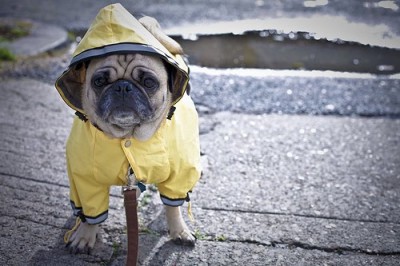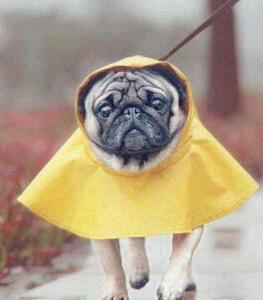Just Tune In To Your Pet…The Natural Barometer
The weather has always played a significant role in our everyday lives. It’s the deciding factor of whether we go out or remain indoors. For the gardener, it will signal whether he or she mows the lawn or hibernates in the greenhouse; for the sportsperson, whether to train in the gym or embark on a five-mile outdoor jog; and for those of the animal kingdom, whether to find shelter or laze in the outdoors. Since time began, the weather has been a much discussed topic of conversation. Although today we are more than likely to tune in for the latest forecast transmitted by experts via the television or internet , in the days of our ancestors, there were no such luxuries. Their primary means of determining the weather was by watching the behavior of plants and animals, whose actions often forewarned changes in temperature.
and animals, whose actions often forewarned changes in temperature.
Suffice to say, such information passed down throughout generations has given thought to many scientific studies, and according to some who have researched the subject, there is perhaps a modicum of truth in that certain animals react to changing weather conditions. Others blatantly refute any such concepts as being mere trivia. Yet, despite what critics may say, many animal owners firmly believe that their pet dog or cat is far more reliable when it comes to weather forecasting than any other modern day means.
Take for example cats, surely one of the most reliable meteorologists in the animal kingdom, whom Mother Nature blessed with an inherent second sense as regards to the weather. A clear example, which can be found in archives dating back to 1849, is that sailors would feel uneasy whenever they witnessed the ‘crew cat’ acting in an unusually playful manner, hence ‘the cat has a gale of wind in her tale,’ which was a forewarning of a storm brewing. Still, on the subject of rain, another aphorism succinctly encapsulates it all: ‘Cats on its brain; it’s going to rain,’ which intonates that if one’s cat lies curled up with the flat part of its head (the area between its ears) on the ground, then in all probability it is going to rain. And the following superstition which has its origins in Scotland says that if a cat is heard to sneeze, then expect a downpour. All the while in Iceland, there is a belief that if a cat lies down with is paws outstretched in front, there would soon be a storm. In southern parts of the United States, a popular concept was that if a cat began eating grass in earnest, and then battened down the hatches, one should prepare for stormy weather.
Cats are by no means alone when it comes to sensing climatic changes. The dog, man’s best friend, ranks as a close leader with frenetic behavior whenever a storm is due. According to a research study undertaken in the Philippines several years ago, stray dogs excreting litter on the streets or in elevated areas weren’t only relieving themselves, but for some reason were forewarning that rain was en route. Without getting too technical, the basic explanation for this strange phenomenon is that because dogs have a keen sense of smell and hearing, they can actually hear very high frequencies. Consequently, as rain develops, the density of air decreases as the moist air displaces the dry air. As a result this drop in air density produces sound and as the sound waves travel, dogs can both hear and smell the coming of rain ahead of human beings. The anticipation of the coming rain causes dogs to become restless, which in turn motivates them to defecate.
For anyone who has suffered at the hands of a tornado, hurricane or earthquake, they know only too well of the devastation they cause. Fortunately, with technological advancement, people can be forewarned before one strikes, but centuries ago, the destiny of our forefathers was left in the hands of the Gods. Yet, it has been noted in diaries retained by our ancestors that some dog owners were prepared and knew something bad was to happen on the weather front when they saw their canine companions whining for no apparent reason and no amount of consoling would calm them down—until the storm came, and then they knew.
Although dogs and cats are noted for their ability in forecasting different bands of weather, one must not overlook fellow members of the animal kingdom. Take for example, insects, fish and our winged companions. Apparently, spiders tend to spin thicker, larger webs when the weather is going to turn dry, and the sight of cobwebs lying on the early morning grass are clear indications of fair weather. Crickets heard to be chirping louder foretell the following day will be a pleasant one. But should you witness an army of ants hastily running, the faster they run, the hotter the weather will be! And watch out for our winged insects—‘Flies bite more before a rain.’ Even fish react to weather changes so much so that many fishermen are guided by their actions, being aware that fish hide on sunny days or when it thunders. If there is a slight ripple of water, then to all intents and purposes, fishing will be fruitful. For those who hail from a fishing family, there is a premise that a rise in air pressure means there will be plenty of fish to catch, although some cynics dispute this and believe that fish start biting when the barometer starts to fall.
No article dealing with weather lore could possibly be complete without a mention of birds, our feathered compatriots for whom the weather is an integral part of their mere survival. Simply watching the return of migrating birds was a clear indication to our forefathers whether the forthcoming summer would be a fruitful one. The earlier the birds returned, the better the summer, but should they return back home late, then people would know they would be in for a harsh winter. One family of birds which clearly played a role in weather forecasting ware crows, from which the following was extracted from an early edition of the Farmers Almanac: ‘If the crow hath any interruption in her note like a hiccough, or a croak with a kind of swallowing it signifies wind and rain.’ Should they be heard to call twice rather quickly and then a third time, it indicates a storm.
Crows weren’t the only birds to possess a talent for weather forecasting. In general, most birds will roost during low air pressure, possibly due to the thinning of air density, which makes it more difficult for them to fly. How many times have you heard this familiar saying attributed to the swallow?: ‘Swallows high, staying dry, swallows low, wet will blow.’ This saying does hold some scientific properties because during fine weather, the insects upon which birds feed naturally fly higher as a result of the warm thermal currents rising from the ground. Consequently, swallows have to fly higher in order to catch their food. And never underestimate the ability of chickens. They may appear to be noisy, busy, little characters, which are always rushing around, but when it comes to the weather, they are quite astute. Apparently, if chickens stay out in the rain, the chances are that it will be an all-day rain. Should they perchance flee back into the chicken house, then the shower will be short lived.
Next time you are unsure of weather, take note of your animal companion’s behavior. It is only true that members of the animal kingdom may not always be correct in their weather predictions, but then again, neither are humans!
By Christine Green
For the Best the Pet Lifestyle and health has to offer follow Wendy Diamond on Facebook, Twitter, and right here at AnimalFair.com!


